Effective communication about water is key to facilitate behaviour change and can motivate policymakers to make better, more informed, decisions about water. But communicating about water is sometimes a challenging task. To help journalists and communicators to better their understanding of water, and improve their communication skills, the World Water Week Communications Initiative was initiated as a pilot programme in 2021.
The programme had two components:
- a free online training course about water and communication, and
- a special section at World Water Week, featuring communication as a critical tool for behaviour change.
The goal was set at having 15 communicators and 15 journalists enroll for the online training course, but interest far exceeded the expectations. A startling 195 communicators and 46 journalists signed up to follow the online workshops.
“I signed up because of my interest in reporting issues around water. Since the completion of the course, I’ve been able to identify some issues about water that had been underreported in my community,” says Justina Asishana, Nigerian journalist working as Senior Correspondent at the newspaper The Nation. Justina adds that she would very much like to recommend her colleagues to sign up for the same training as “a lot of them are not knowledgeable about water and communication.”

Testimonials from 2021. Download the full pilot programme report here.
Her words are echoed by a Kenyan journalist, Kenneth Kavulu, Pan-African journalist and TV-producer.
“I think the training was impactful to the journalists working with WASH and it needs to be done annually,” he says.
Kenneth signed up to get more knowledge and different perspectives on water and communication, as well as getting a chance to network with other professionals.
The training course in water and communication was made up by a series of online workshops. One track was specifically aimed at journalists, and one track was tailor-made for communicators.
In the follow up survey, 96 per cent strongly agreed or somewhat agreed, that the training course would “help them communicate more powerfully about the world’s water problems”.
“The course allowed me to meet new people who share the same interests, and to collaborate with some on other projects. I found the sessions on science communication and storytelling super interesting. I could use the elements of the course in engaging the audience on social media,” concludes Mukta Dhere, Communication Associate at DCAF (Geneva Centre for Security Sector Governance). Mukta was one of 13 selected contributors who showcased their communication work on the prestigious Centre Stage at World Water Week. Another piece was presented by GIZ GmbH and their project in Bolivia. Kirité Rugani, Component Manager for Capacity Development, summarizes the importance of communication in the water sector:
“Part of my work is to support our communications teams with new inputs and ideas. Furthermore, I see communication as very important in relation to `environmental education´ and general awareness raising activities. Knowing about different formats and approaches is very helpful. I shared all the inputs [from the training course] with my team, and we discussed different options. I am very glad for having had the opportunity to participate. And I would definitely propose to my colleagues to sign up in case there is a repeat!”
- Download the pilot programme report here.



